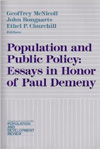-
Demography and Political-Socioeconomic Change
April 1, 2013 By Graham Norwood
In “On Demographic and Democratic Transitions,” published in the February edition of Population and Development Review, author Tim Dyson postulates that the so-called “demographic transition” – a two-step process in which diminishing mortality rates are followed by decreases in total fertility – is an important predictor of a society’s transition from autocracy to democracy. Specifically, Dyson suggests that the population surge resulting from a decline in mortality may tend to destabilize pre-democratic regimes, while a subsequent drop in fertility rates may empower women and raise the median age of a population, thus paving the way for democracy to emerge. Dyson demonstrates a statistically significant correlation between population aging and inclination toward democracy, echoing the work of New Security Beat contributor, Richard Cincotta.
Appearing in the same issue of Population and Development Review, Wolfgang Lutz’s “Demographic Metabolism: A Predictive Theory of Socioeconomic Change,” offers the potential for demographic modeling on an even finer scale. Lutz argues for a “multi-dimensional cohort-component model” that divides populations not just by age and gender, but by region, marital status, highest attained level of education, or other significant factors. By disaggregating these factors, Lutz hopes to measure the impact of “demographic metabolism” – essentially, the gradual replacement of older generations (Lutz employs the statistical term “cohorts”) with younger ones. This kind of analysis can, for instance, tease out the differences between changes that develop within a population over time – the increasing preference for stability that tends to accompany aging, for example – from changes that occur when one cohort’s preferences is crowded out by another’s.
 A Publication of the Stimson Center.
A Publication of the Stimson Center.




